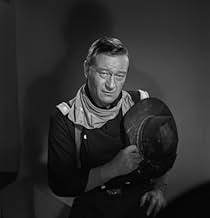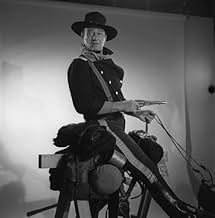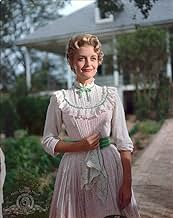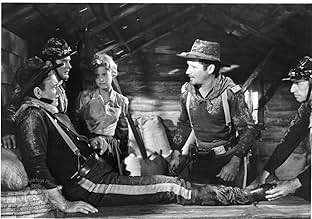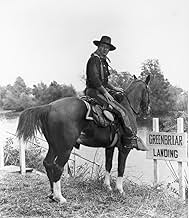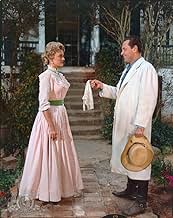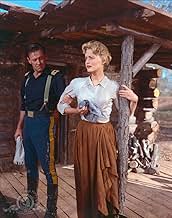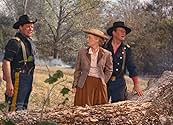En 1863, un batallón de La Unión debe hacer una incursión tras las líneas confederadas en Mississippi para destruir los ferrocarriles enemigos, pero una bella prisionera sureña y el médico d... Leer todoEn 1863, un batallón de La Unión debe hacer una incursión tras las líneas confederadas en Mississippi para destruir los ferrocarriles enemigos, pero una bella prisionera sureña y el médico de la unidad causan tensiones dentro de las filas.En 1863, un batallón de La Unión debe hacer una incursión tras las líneas confederadas en Mississippi para destruir los ferrocarriles enemigos, pero una bella prisionera sureña y el médico de la unidad causan tensiones dentro de las filas.
- Dirección
- Guionistas
- Elenco
- Premios
- 1 nominación en total
- Dirección
- Guionistas
- Todo el elenco y el equipo
- Producción, taquilla y más en IMDbPro
Opiniones destacadas
It's the sort of Ford film that must have been hard on the actors, riding through swamps on horseback and engaging in fierce battles when pursued by Rebel forces. William Holden has some wonderful moments as a doctor who is constantly bickering with John Wayne. Their exchanges provide plenty of tension and humor--and both actors are at their best under Ford's direction.
A good Civil War western combining magnificent photography, good performances and some rousing battle scenes. The horrors of war are not ignored and there are some sentimental moments that never strike a false note.
Col. John Marlowe (John Wayne) is assigned to take a small brigade of cavalry from Tennessee, ride hundreds of miles into the Confederate territory and destroy the railroad at Newton Station, Mississippi, thereby cutting the supply line to Vicksburg... To do it, he will have to avoid all contact with rebel forces until he has reached his target...
The first problem Marlowe encounters is Major Hank Kendall (William Holden), an obstinate surgeon who will be accompanying the force... Marlowe has the expected contempt of the combat soldier for his colleague who carries no arms... In addition, when Kendall asserts his rights as an officer in the medical corps to declare unfit any soldier he considers so, Marlowe and Kendall clash...
The next problem is Marlowe's second in command, Col. Secord (Willis Bouchey), who makes no secret of his plans to use his military career to further his strong political ambitions...
The third problem is the high-spirited belle Hannah Hunter (Constance Towers). This violent Southern patriot gives him an initial hard time... The Yankee soldiers stay at her plantation soon after they cross into the Confederacy... When Hannah learns their plans, Marlow is forced then to take her along with them for security reasons...
Holden and Wayne (violently opposing strong personalities) perform their assignment with a consummate force, intensity, and expert teamwork... Constance Towers, too, registers a vital presence... At their first dinner, she passes Wayne a platter of chicken... As she leans over, threatening to divulge her engaging décolletage, she says: 'Oh come now, Colonel, a man with a great big frame like yours can't just nibble away like a little titmouse. Now what was your preference, the leg or the breast?'
Incorrigibly sentimental and romantic in his big cavalry epic, Ford's motion picture is full of heroic cavalry on the skyline imagery... Among the more affecting scenes is that in which a harsh compassionate Wayne comforts a dying young soldier and the one in which he registers his love for Towers... There is also a compelling sequence, pure John Ford, in which a group of teenage cadets march out from a Southern military academy to take on the enemy, which makes manifest to battle boys and pulls a retreat, leaving the kids cheering...
Historical inaccuracy aside though the movie did quite well. The film showed multiple viewpoints and a fair degree of respect for most of them. It showed aspects of the war that were generally ignored in other films of the period -- the bloody horror of battlefield amputations, the desire of people to give up on the whole thing (I can't think of an earlier film that talked about deserters and the way they disrupted the southern home front), and the pain of the sheer physical destruction of the war -- a pain that affected the destroyers as well as the victims, something Gone With the Wind never quite admitted.
Some posters have complained about southern belle Hannah Hunter's overuse of sex appeal to spy on Union soldiers -- while there was no historical Hannah Hunter there were plenty of southern women who did just that, including Belle Boyd, Rose Greenhow and others. Some posters have complained about the way the film trivializes slavery -- this is unfair. It underplays slavery but never trivializes it. It shows conflicts within the Union army about the institution and addresses the issue of personal loyalty between some slaves and masters without glamorizing the institution as a whole. Does the film go far enough by modern standards? No. But it goes much farther than its contemporary and treats the slavery issue more honestly than modern travesties like Gods And Generals.
One poster actually complained about how inaccurate southern snipers were -- this is completely unfair. There was no indication that the "snipers" were specially trained men with Whitworth rifles or anything like that. They looked more like ordinary troopers out skirmishing, or perhaps the even more poorly trained militia. Ordinary soldiers fired more than 100 rounds for every hit they scored, so poor shooting on either side is nothing to be surprised about.
8 out of 10
Duke is fine. It's not one of his more memorable roles, though that's more the fault of the script than his performance. William Holden plays an army surgeon Duke is forced to take along with him. In all honesty, Holden's character seems completely tacked-on to the plot. He could've been removed entirely without upsetting the film much. It might have even improved it. Constance Towers is fun as a Southern belle the soldiers have to take with them on their march. At first she seems flighty but soon shows there's more to her. She also has one of the most provocative scenes from any Ford film, where she bends down in front of John Wayne with her cleavage exposed, offering him some chicken and saying "Would you like a leg or a breast?" She's probably the only standout in the film. It's not one of Ford's best. It's watchable and interesting enough, but also overlong and familiar in tone to other cavalry movies I've seen, despite the change in locale. Obviously Wayne and Ford buffs will want to check it out.
In PRISONER OF SHARK ISLAND he dealt with the story of Dr.Samuel Mudd, who was sentenced to life imprisonment for involvement in Lincoln's Assassination. In HOW THE WEST WAS WON, Ford did the segment dealing with the battle of "SHILOH", with Harry Morgan as General Grant and John Wayne as General Sherman. This film was the nearest that Ford ever got to his dream film. THE HORSE SOLDIERS was the only film that was devoted to a full study of the effect of the war in the South, on both Union and Rebel soldiers. While not, perhaps, the best that Ford could have achieved - he was in the twilight of his master career - it is a fine film none-the-less.
The story is based on an incident in 1863 known as Grierson's Raid. Cavalry leader Benjamin Grierson was sent by Grant into Alabama and Mississippi on a raid to attack a railway junction, supposedly to destroy it for strategic reasons. While it was important to knock the railway junction out of effective work, the real purpose was to tie up Confederate forces in these backwaters. Since December 1862 Grant was struggling to capture the city of Vicksburg, Mississippi, the last major Confederate stronghold on the Mississippi River. But try as he did Grant kept losing to the Confederates under Joseph Johnston and John C. Pemberton (the commander in Vicksburg). But Grant had noticed how Confederate cavalry men like Earl Van Dorn and Nathan Bedford Forrest had forced him to use men to protect his supply lines, and took valuable time away from him trying to fight off or track them down. He decided that Grierson, a first rate Cavalry leader, could do the same thing to Johnston. A very intelligent Confederate Commander, Johnston was nervous at unexpected difficulties. Grant reasoned that Grierson's men would panic Johnston, and cause him to waste time chasing him down.
As it turned out Grierson's Raid worked. The pinning down of large numbers of Rebel troops in Alabama and Missisippi was wonderful for Grant's Vicksburg campaign. It was the beginning of the successful conclusion of the campaign, as Johnston's attention was now split between trying to help support Pemberton and trying to reassure frightened southern populations in the hinterlands. Grierson got most of his men back to Northern lines. Vicksburg was able to hold out until July 4, 1863. It's fall (the day after Lee's defeat at Gettysburg) really marked the beginning of the end of the Civil War.
This incident is the basis for THE HORSE SOLDIERS. Ford concentrates on what the experience of the war must have been like in the Southern countryside. Certain things are taken from other incidents and battlefields. When a military school's cadets are brought into the field to try to catch or slow down John Wayne's men, Ford is really picking up on an incident in the war in Virginia, when the young cadets at the Virginia Military Institute came out to fight the Union troops under Sheridan in 1864. One can forgive the transition of the incident.
It has been pointed out that one of the characters, Colonel Secord (Willis Bouchey) is a splendid type - the political officer. Men like Secord (usually in the position of General) bedeviled both sides, because of their usually normal level of mediocrity or idiocy. A few rose to the job well - the best of the Northern political generals was "Black Jack" Logan, who would be a valuable associate of Sherman in the battles around Atlanta. But for every positive General Logan, there were thieves like Benjamin "Spoons" Butler, who feathered his nest as military governor of New Orleans (he supposedly stole even the silver spoons of the citizenry). Actually Secord is normally intelligent, and follows Wayne's strategy. But he is constantly looking ahead at post-war elections. Towards the end he even wonders if the White House beckons.
Another lovely moment shows the fraying of the Southern cause. Wayne and his men come across two Rebel deserters (Strother Martin and Denver Pyle) who have tied up the local sheriff (Russell Simpson). Wayne thanks Martin and Pyle for their unofficial assistance to the Northern cause,telling them which way they plan to go. While Martin chatters away (mentioning the strength of Rebel forces in the area), Wayne carefully knocks out Pyle and then Martin, and then unties Simpson and assists in tying up the two deserters. William Holden is watching this, and later asks why he helped Simpson. Wayne explains that he decided to feed the deserters false information about his own movements, as they would probably give the information to the Confederates later on anyway.
All the performances are fine, with Wayne in particular as a man who hates doctors and medicine for a valid personal reason. Holden is in a subordinate role but he gets some nice moments. So does Constance Towers, in a rare leading part, as a passionate Confederate supporter who gradually gets to like Wayne. Carleton Young, as a former friend of Wayne, has a moment trying to rally Confederate forces at the railway depot.
It is a good Ford film, and makes one wish that Ford had made his Ulysses Grant biography.
¿Sabías que…?
- TriviaThe film marked the beginning of mega-deals for Hollywood stars. John Wayne and William Holden received $775,000 each, plus 20% of the overall profits, an unheard-of sum for that time. The final contract involved six companies and numbered twice the pages of the movie's script. The film, however, was a financial failure, with no profits to be shared in the end.
- ErroresIn the shot right after Hank Worden throws the torch onto the cotton bales, look at the upper left of the screen. You will see an airplane flying from right to left.
- Citas
Miss Hannah Hunter: [bending over with a plate of chicken, revealing ample cleavage] Do you prefer the leg... or the breast?
Col. John Marlowe: I've had quite enough of both, thank you.
- ConexionesFeatured in Directed by John Ford (1971)
- Bandas sonorasI Left My Love
by Stan Jones
Selecciones populares
- How long is The Horse Soldiers?Con tecnología de Alexa
Detalles
Taquilla
- Total en EE. UU. y Canadá
- USD 1,753,526
- Tiempo de ejecución2 horas
Contribuir a esta página



